IAN ROSS: It (Radio Caroline) is a serious thing now. You can study it in media studies; you can think of it in a technical way; you can think of it as having changed things. It created a music industry - it
really did - (Chris) Blackwell[14] and people like that, who I still see sometimes, always credit it with having made the critical difference, say, to Island Records, from when he was running around
with ska and bluebeat in a minivan...
RAY CLARK: My Boy Lollipop - that sort of thing.
IR: Millie, yes. Good example. Bang. That could happen. He had just ska and bluebeat, a little warehouse in the Harrow Road and a minivan and now - I am not saying that Chris wouldn't have been (successful) anyway...
RC: Again - right place, right time.
IR: He acknowledges it and Denny always acknowledged it as being the nucleus, the catalyst for everything, all this change and I think other people, Mick Jagger, those sort of people, they all would acknowledge that Caroline - which
has now become a sort of national icon... When we started it, it was serious in a sense; it was definitely a big idea but we were kids, you know, and in that sense people were doing it...., kids.
Andrew Oldham[15] was 16 when he was managing the Stones. His mother had to sign the contract. He was an infant in the eyes of the law. Everyone were young kids, making it up as they went along and that
was the atmosphere. Whatever people say about the sixties, the atmosphere that was prevailing in London in '63,'64, '65 was this highly inventive, creative, no rules, no plan whatever kind of thing. The Beatles were here. They didn't
live in Liverpool. They lived here. It (London) had a very village atmosphere; everyone knew everybody because they always went to the same club. First of all it would be the Crazy (Elephant) then it would be the Ad Lib. You saw
everybody - actors and people like Antonioni[16] came over, all these people, Dylan, they all came to London - for a while - and then it all went wrong and Harold Wilson taxed everybody and everybody left
town. There was that period - and the Woodfall[17] period as well - films like Saturday Night and Sunday Morning - it all happened in this very intense, still in black and white (world). Everything
in that period is what I'm really talking about. That very, very concentrated, very intimate, very intense, very exciting, very creative, very innovative short period in British history when the post-war thing ended and everything
went dingle-berries! I was really lucky to be born in 1943. I still feel that way, you know. I think things have changed a lot, not for the better in many ways. For instance Richard Briers[18] died
yesterday. You look at The Good Life. You think it is really sad. That was the seventies and it was just nicer. I always watch those old sitcoms like Fawlty Towers. They are changing some of the lines. Give me a break.
Someone is always going to be offended now.
RC: That's the whole idea of comedy, isn't it?
IR: It's meant to be anarchic. It's meant to be no-holds-barred. There's not meant to be any sacred cows in comedy.
RC: Everything's too neat and clinical now.
IR: It's clinical and it's scary. People are unfriendly. Someone's going to kill you or else they are going to be offended by something you say. Or you're going to be arrested. It's gone very horrible now. I just remember (in the
sixties) in the street, for example, in the Kings Road, people just went up to each other, mainly up to girls or whatever, you went up to people and said hi and people weren't frightened.
RC: Try it now you'd be arrested, wouldn't you?
IR: Try it now you'd be arrested - that's the difference. How friendly everybody was, what an age of innocence it was. Right up until through the eighties and then I think things started to go downhill.
RC: Well let's hope everything is cyclical and we can get back to it.
IR: My idea now is to start a radio station. What we did (on the radio) was great at the time but it has evolved into something really dire. There isn't much on the planet more depressing that British radio as we have now got it.
It's so formulaic and this thing we had, which was a new idea imitating Wolfman Jack[19] and Dandy Dan Daniel,[20] these kind of people on American commercial radio... The
only people who have really got it right are people like Smashie and Nicey, that kind of piss-take of what British disc-jockeys are really like, or Alan Partridge on Radio Norwich. They see it for what a dire loads of rubbish it all
is. Every channel is the same.
RC: Did your dad ever get any money back from Caroline?
IR: No.
RC: It all went?
IR: It went. Yeah. It all ended, I think, quite badly. I don't like to dwell on that side of things.
RC: Nobody got rich - or did anyone get rich out of it?
IR: Not us. My dad didn't mind. I think he felt let down to be honest. He felt rather let down by Ronan in the end, I think. It all ended not in a good way. I think they felt let down. I think Ronan did let them down really. I hate
to say it but he let himself down in a funny sort of way. I always just thought he was an incredibly great guy - and I still do - but it didn't end well. I mean my dad absolutely loved Ronan and it was unconditional. He just thought
he could do no wrong and I think he did feel let down. He didn't feel particularly let down financially - the amount of money wasn't significant - but it didn't make a million a month or anything. But it didn't matter to him because
he used to walk around with his Hacker radio - my mother used to collect every press cutting - and they loved it. They used to just listen to it the whole time.
|
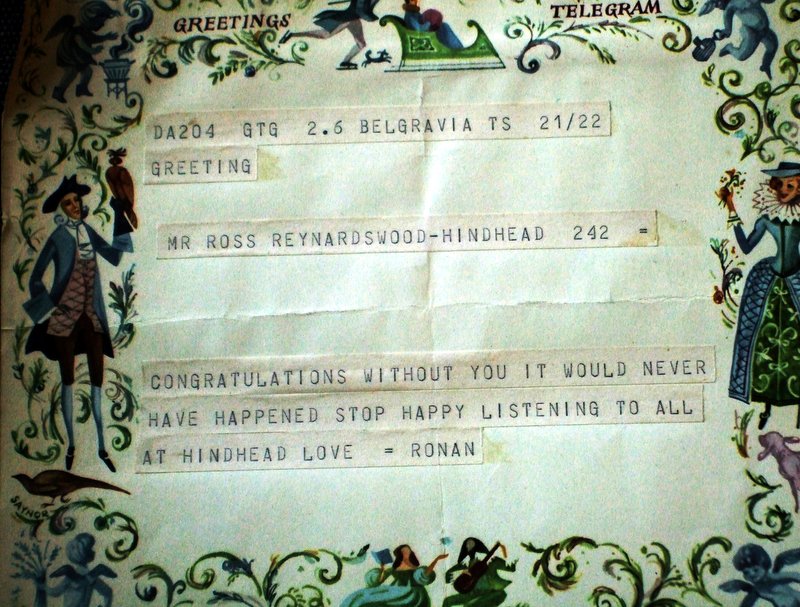
|
| Telegram from Ronan O'Rahilly to the Ross family, just after the launch of Radio Caroline. Image kindly provided by Ray Clark. |
RC: (Going back to the start) you went to your father and he then in turn went to friends like Jocelyn Stevens...
IR: Yes. I went to my father with Ronan that night, with Chris. We had dinner and Ronan pitched. Unbelievable. My dad just sat there nodding and drinking his gin and tonic. Then he didn't say anything. Then we had dinner. Still didn't
say anything. He was a bit like that, he didn't used to say much. We were all nervously eating, trying to eat these peas and the lamb chops, my mother getting more and more flustered, when he suddenly got up and left the dining room.
(Falsetto) “where are you going Jimmy?” “Never mind where I'm going” and he went into the sitting room and he rang his mates Jocelyn, John Sheffield and these stockbroker guys who again were in his kind of
gang. He had a lot of chums who used to pull God-knows-what strokes. He owned a little bank called Close Brothers - now a big bank - but that was his base and I think they came in. If he recommended something, people bought it. That
is what he was like. He had a reputation. They thought it was a flutter. Anyway, long story short, they put in the money that night. It was all done in that same day I met Ronan. There was no time delay. We went straight to Haslemere,
got the money. There may have been some sort of technical hiatus while the money was assembled - how it became a cash amount in a suitcase, I really don't know - the next thing I remember is the explosion in the flat, utter destruction
of that flat and how we laughed and laughed until we cried. That's how funny it was.
RC: What about Jocelyn? Was there ever a point when he bowed out or did he just fizzle out?
IR: It's a pity. I don't think you could interview Jocelyn now.
RC: No. I've been in touch with his wife via email but she says no, he wouldn't remember.[21]
|
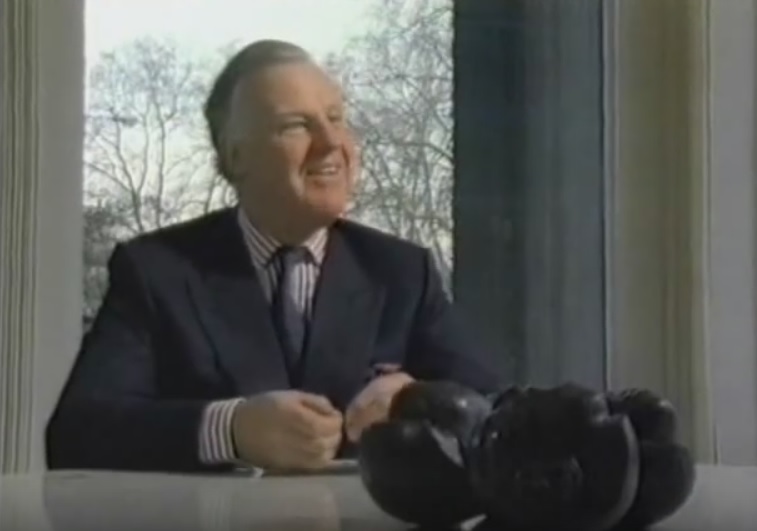
|
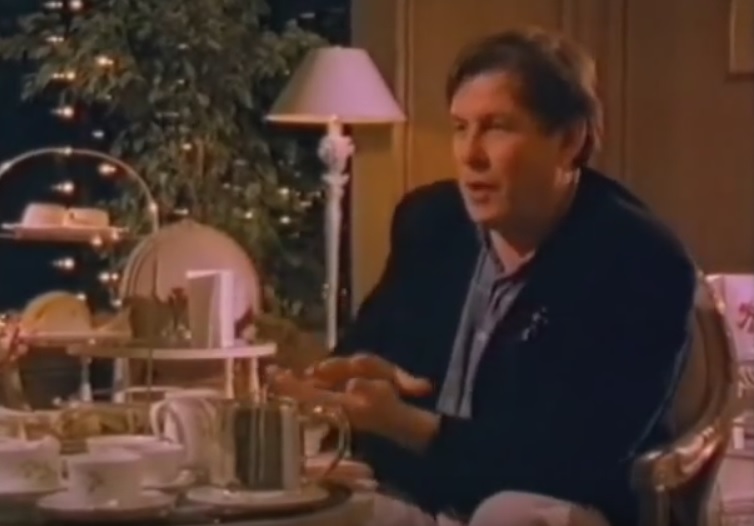
|
| Sir Jocelyn Stevens on ‘A Pirate's Tale’ BBC-TV documentary.
|
Ian Ross on ‘A Pirate's Tale’ BBC-TV documentary.
|
IR: Well he's on Peter Lydon's thing, A Pirate's Tale.[22] Jocelyn is interviewed in that and he's very amusing about it. I don't remember how.... I remember there was
a bit of a change in everything when Ronan got that Irish guy...
RC: Phil Solomon
IR: Yes - that didn't impact too well on the others, I don't think. I really can't say. I got fired anyway when Solomon arrived. He took one look at my decorations and he didn't want me around.
RC: Presumably Ronan had gone in search of more money...
IR: More money, more money. Brought him in and then we played The Bachelors a lot. A lot! And I think that was the beginning of the end of Radio Caroline. That's my opinion.
RC: Yes, from what I've gleaned and, just as a listener, there was a distinct change then.
IR: It went really downhill from a listening point of view. Everything up until then had been very genuine and sort of youthful enthusiasm but, from the moment that guy came along, the whole atmosphere changed. Caroline House changed.
I remember when we went to Ibiza, he (Ronan) went back after a week but I stayed. I thought I was going to live there. I was still in the villa with this guy Peter. I got really friendly with him. We use to go into Santa Eulalia and
this con man had come along, this American con man, and he'd got 300 American girls conned into this university idea of his and he had absconded with their parents' money. So there were these 300 girls just seething around Santa
Eulalia in their bikinis... It was honestly like being in heaven! And we started a night club on a boat in the harbour, me and Peter. We got permission from the harbour-master. This was a place like... there were Nazi generals in
their staff cars[23]. It was really fantastic, the whole thing. Then one day I get this letter from Bunty, a sad letter, saying her father had died and she missed me. I was on the next plane. I abandoned
my night club plan and my 300 American girls and Cala Llonga, came back to London, went to Caroline House and the difference was immediate. I was still sun-tanned and freaked out and laid-back, all that, but it had all changed. There
was a different girl sitting there “who are you?” No one knew who I was - or wanted to know - and this is what had happened. Solomon had come along and it was the end.
RC: Tom Lodge said that when he turned up, that was the beginning of him going out. He didn't want to be there.
IR: You didn't want to be there anymore. You didn't want to be there in that atmosphere anymore. Solomon ran the place. He was a very unpleasant, rude guy. I didn't like him and he didn't like me.
RC: There was a suggestion that when Radio London came along, Ronan went and knocked on the door and said “hey, can we do business together?” Do you remember any of that?
IR: No. He may well have done. Ronan would knock on anybody's door. He managed The Animals. That's the only other story I can tell you.
|

|
| An invitation to The Scene Club, shared on the Soul Source forum by ‘Funky 4 Corners’. |
RC: Yes. And he had The Scene Club. Did he run it or did he own it?
IR: He owned The Scene Club or, to all intents and purposes he owned The Scene Club. He used to run The Establishment Club[24] before that. He used to tell us a lot of things about Peter
Rachman.[25] I think Peter Rachman owned the Establishment Club. Ronan was very involved in all those things.
RC: Jimmy Houlihan[26] - didn't he work for Rachman?
IR: Jimmy - probably. Is Jimmy still around?
RC: No he died a couple of years back.
IR: He was the chief heavy at The Scene. I used to know Houlihan really well.
RC: So he'd come through the club then to Caroline?
IR: I suppose. When you went down to The Scene Club there were these heavies. They were this big. They were built like chests of drawers and they had very tight dinner jackets. They had hatchets over the door. That's how they used
to operate. And there were purple hearts. It was a mod club. It was Ronan's club. He was in the music business. He used to do a lot of things with Rik Gunnell - what was it called? The Ricky Tick,[27]
the tour, the London tour - and all these bands used to play the Ricky Tick. The Kinks, a band called The High Numbers who were The Who, The Stones up to a point. They used to play Eel Pie[28] and they
used to play the Station Hotel. So Ronan - I think it was Ronan or Chris or both - discovered this band in Newcastle called the Alan Price Rhythm & Blues Combo. Ronan renamed them The Animals and brought them to London. I think
they lived in my flat. My job with them was to - I think I had to buy the van as well - I drove the van. I think I bought the bloody thing. I may or may not have bought the Hammond organ. I really liked them: Chas, who's dead now,
and Eric. I really got on with Eric. We used to do two gigs a night. This was really all because of Ronan, his management thing. Again, I was given a job: drive the van. You know, you've got a gig at this pub in the afternoon, another
one in the evening. These guys would be dead drunk by the time we got to the second gig and it was just fantastic. We did play Eel Pie once. I've never been so scared. You had to cross this bridge. We had to get the Hammond organ
across the bridge. It was freezing cold, icy. Get there. “We want the Stones, we want the Stones.” I was in the crowd but couldn't stay there because I would have been killed. They were on stage and they were just pelting
the band; pelting the band; so Chas walks to the front of the stage, unzips his trousers and starts pissing on the people in the front (laughs). The Animals - a good name for them!
Ray's question is missing from the recording but he must have asked about John F. Kennedy's assassination and its effect on Ronan O'Rahilly.
IR: He (Ronan) was coming down to dinner.
RC: After the deal had been done.
IR: Well we had an ongoing friendship and relationship. I was in Haslemere with my father and mother and he was on his way when it was on the television that JFK was dead. I remember opening the door and saying “come in Ronan.
Something terrible has happened. You'd better sit down.” He didn't drink but my dad poured him a brandy. He literally turned green when we told him what's happened. It was just one of those things, to have to be there and break
the news because the importance of JFK to Ronan was absolutely... Ever since then he has been pursuing this Kennedy film or documentary about Kennedy.[29] I remember going to see Years of Lightning,
Day of Drums (a film about John Kennedy) with him at the Curzon and just weeping. He was sobbing - I was too - we were sobbing. The drum was beating, Robert Kennedy read the poem by Dylan Thomas. It was terribly moving and I
remember sitting there with Ronan. There had already been the Warren Commission. “All lies, all lies” so Ronan has these things - obsessions if you will - which carry on through the decades, through his life: the Kennedy
thing, the Caroline thing - they were great things for his whole life to be devoted to. I am sure he does other things but he has these missions. He still lives in that little flat in Chelsea;[30] he still
eats at whatever-its-called on the Kings Road. If you want to see Ronan, you just go to the Picasso for lunch or go to the Chelsea Arts Club in the evening, whereas I just wanted to move on. And I have. I've got six kids and 14
grandsons and all that kind of thing. In a way life becomes your family.
Missing question, presumably about Caroline's legality.
IR: (Radio) Veronica[31] was the original although, as Ronan used to say, Voice of America was on a ship stirring up revolutions around the place. They weren't in the same position quite as we were
legally - or illegally - but the corporate structure was... One of the things he told my father that night was that it had already been figured out that you have a ship in international waters flying a flag of convenience - in our
case, I think a Panamanian flag and I think we had a Bolivian flag that we could fly if there was a problem; we had an Irish company and there was a company in Liechtenstein, and something complicated to do with leasing something...
The corporate structure is well known. These companies now that people are on about, because of the tax, have similar arrangements. The main company was called Planet Productions and it was based in Dublin. It was an Irish company.
It leased the airtime from the Liechtenstein company. They owned the ship, I think, or something like that, and then the London company had a contract to sell advertising from the Irish company. So where the profits, if any, were
made, I would not know. We didn't see any of them anyway. That was how it works and so he was able to say it's completely legal.
RC: Do you think, with hindsight, at the very end - and I know you weren't around then - when Wijsmuller said “we'll have our ships back, thank you very much”, do you think they were their
ships then and they had just been leased or were they owned, for want of a better word, from the cash that Chris took out. Or do you think they were always Wijsmuller's?
IR: I've never really thought of that. I thought we owned the ship. I thought we paid... They impounded the ships. We definitely bought the Caroline. I know we did. I remember that clearly. I wasn't around as much - I used
to see Ronan but I wasn't directly involved - when they towed the ships. I don't know who owned the Mi Amigo but I remember buying the Caroline. They impounded them because they were owed money for the ongoing services they provided
in the shape of sea crew, skippers, the chef - the most important guy on board - all this sort of thing, fuel for keeping the ship at sea, and they were owed money. I don't think they necessarily were claiming that they owned the
ship but they had a lien on the ship and, when it came to it, they hadn't been paid. They towed the thing away with Johnnie Walker still broadcasting. And that's a legend as well, isn't it?
|
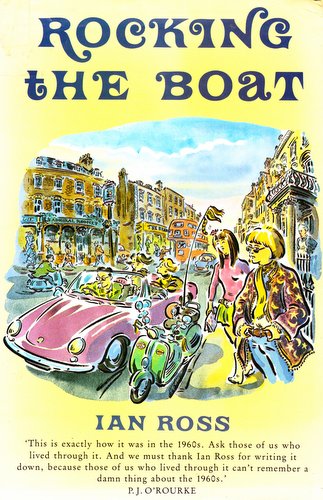
|
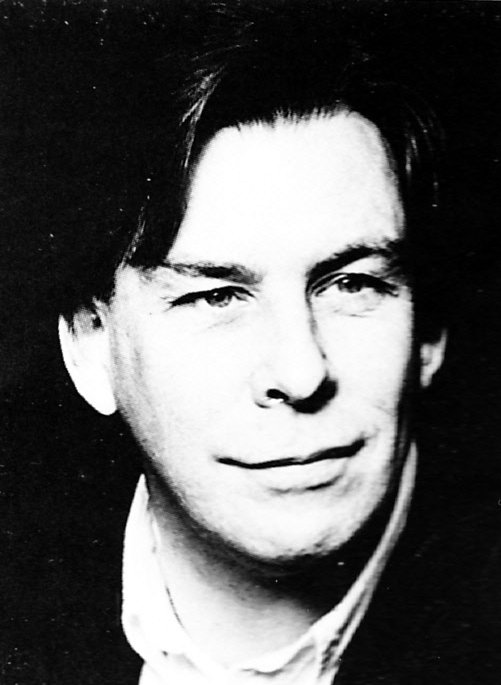
|
| The front cover of ‘Rocking The Boat’, published by Heinemann, 1990.
|
Ian Ross, as he appears on the inside back cover of his book ‘Rocking The Boat’, published by Heinemann, 1990.
|
NOTES
|
|
|
|
|
Ian may have been slightly exaggerating Oldham's youth but he definitely was under 21 and therefore, at that time, a minor. Wikipedia: Andrew Loog Oldham.
|
|
|
Italian film director Michelangelo Antonioni made the movie Blow-Up in London. Wikipedia: Antonioni.
|
|
|
Woodfall was a successful British film production company.
Wikipedia: Woodfall Film Productions.
|
|
|
|
|
|
|
|
|
|
|
|
Sir Jocelyn Stevens died in October 2014.
|
|
|
BBC TV documentary about Radio Caroline, available on YouTube.
|
|
|
Spain was a dictatorship under General Franco until 1975. Wikipedia: Francisco Franco.
|
|
|
We have no evidence that Ronan (or Rachman) had anything to do with The Establishment Club. We think Ian might be referring to
another club, La Discothèque, in London's Wardour Street.
|
|
|
A notorious slum landlord. Wikipedia: Peter Rachman.
|
|
|
Jimmy Houlihan was a friend and associate of Ronan's for many years. He died in July 2010.
|
|
|
|
|
|
|
|
|
Ronan's long-term, and uncompleted, film project was King Kennedy, see IMDB.
|
|
|
This is no longer true. Ronan died in April 2020. See tribute.
|
|
|
Radio Veronica was a Dutch offshore radio station which pre-dated Caroline. Veronica broadcast from the sea between 1960 and 1974.
|
Back to previous page.
Our thanks to Ray Clark.
Another of his interviews is over the page.
|

